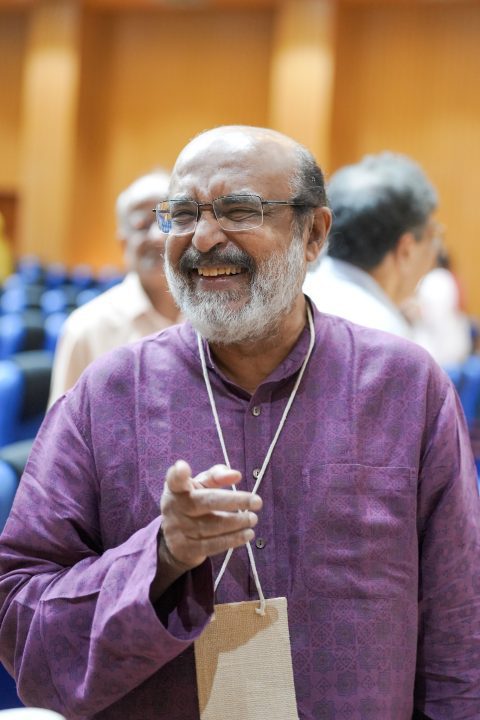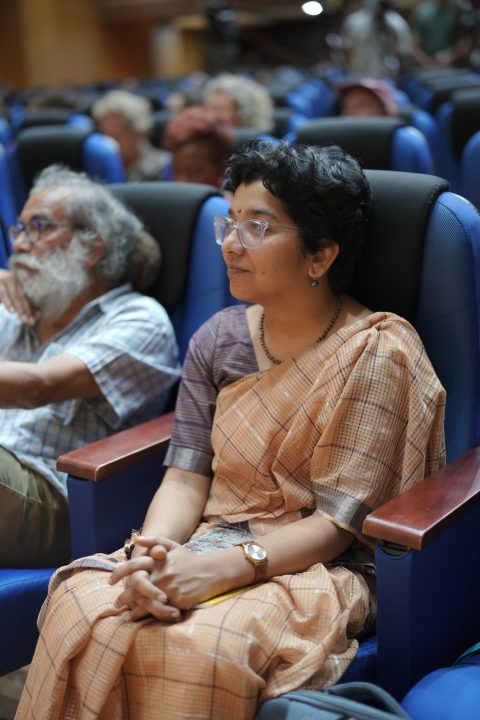The Platform Cooperativism Consortium held its eighth global conference in India this month. Participants issued a declaration envisaging “a techno-social order rooted in the principles of fraternity and cooperation.” The Roots of Resilience conference was held from 30 November to 2 December 2023 in Thiruvananthapuram, the capital of Kerala state, and welcomed 105 participants from 15 countries.
Contributing organisations included the International Cooperative Alliance (ICA), the Brazilian OCB, India’s farmer-owned co-op IFFCO, the International Labour Organization (ILO), Mazdoor Kisan Shakti Sangathan, SEWA Cooperative Federation, Indian Federation of App-based Transport Workers, alongside the ICA’s Asia-Pacific office.
The venue for the event, Kerala Arts and Craft Village, was built and is managed by the Uralungal Labour Contract Co-operative Society (ULCCS), one of India’s oldest and largest worker co-ops, founded 98 years ago.
The conference, a collaborative effort by the Platform Cooperativism Consortium (PCC), IT for Change, and the Kerala Development and Innovation Strategic Council (K-Disc), resulted in the The Thiruvananthapuram Declaration.
The declaration posits that “our collective digital futures hinge on shared ownership of technological resources so that innovation ecosystems can foster inclusive, equitable, just, and creative societies.”
It advocates a five-point agenda:
- A publicly financed, democratically governed digital commons giving communities collective ownership of their data.
- A “whole of society approach” for empowering futures of work, nurturing worker-owned platforms.
- Reforms in the co-operative sector to ensure competitiveness and sustainability in the digital age.
- Prioritising co-operative and other social models in state education and training, to promote socio-political citizenship with an awareness of democratic ideals, critical reasoning, and digital rights awareness.
- A sustainable digital transition to an AI economy favouring “a regenerative, local knowledge paradigm that advances sustainable livelihoods and harmonious coexistence between the human and non-human worlds.”
The Thiruvananthapuram Declaration can be endorsed using an online form, accessible to stakeholders, supporters, and the general public until January 31, 2024.

Takeaways from Roots of Resilience
Roots of Resilience seamlessly integrated three key themes: the adoption of co-operative principles in the digital economy, the development of equitable public policies for India’s digital landscape, and the integration of feminist perspectives into platform economics. The three-day conference showcased international platform co-operatives, exploring the intricacies of tech-enabled economic justice. A special focus was on the Kerala model for the digital economy, which emphasised sustainable agricultural practices and the pivotal role of public policy in fostering digital equity.
Related: Platform co-op looks to show a better way forward on AI
A panel comprising government representatives, riders’ associations, practitioners, and academics examined the challenges facing digital platform workers in the country, including low pay, lack of social protection, data protection, and bargaining power. Meanwhile, platform co-operatives grapple with restrictive legal and policy regulations, insufficient start-up funding, digital literacy gaps, and sometimes business know-how.

The host state, Kerala, was spotlighted for its digital innovations in agriculture, transportation, and food sectors. In 2021, the state government launched its Comprehensive Programme for Employment of the Educated Unemployed, which includes a long-term goal of creating thousands of platform co-operatives.
In 2019, while the policy was in development, Kerala’s finance minister, Thomas Isaac, invited Trebor Scholz, founding director of the PCC, to address the state’s legislative assembly. The conference marked “a continuation of that work”, says Scholz, who told a press conference: “I’m excited to return to Kerala to talk about how co-operative principles amplify solidarity in the digital economy, aiding unemployed youth and farmers.

“In Kerala, cultivating a public option for platform co-ops with legislative support can reshape both the digital economy and legacy co-operatives. This event is all about learning and seeds for concrete transformation. Our global work underscores the potential of platform co-ops in sectors like ride-hailing, care, home services, and data governance.”
Anita Gurumurthy, a founding member and executive director of IT for Change, told Co-op News that “India’s policies seek to reap the demographic dividend – build young people’s capabilities for meeting the digital future. Platform enterprises hold immense potential as new age options. But the Uber or Amazon model undercuts local economic development, not to mention the indignity that they trap young people into.
Related: Meet … interview with Trebor Scholz
“The Roots of Resilience conference was pathbreaking for its simple message – can we imagine platform enterprises led by workers with support from the government? Can we learn from the various initiatives from around the world?”
The conference included a presentation from Thailand, where two platform co-ops, Tamsamg-Tamsong and Homecare Thailand, were introduced to delegates by Akkanut Wantanasombu. Sujith Nair elaborated on the Beckn Protocol‘s role in Bangalore’s Nama Yatri auto-hailing app, showcasing how this open, peer-to-peer decentralised network protocol innovatively enhances urban mobility. Prashant Mehra emphasised the critical role of the Platform Commons Foundation in creating inclusive platforms to tackle global challenges.

Discussions across the three days addressed challenges in the mainstream platform economy, Scholz and Gurumurthy tell Co-op News. They categorise these as:
- The rapid advancement of the digital economy is leading to increased worker exploitation, stalled labour rights, deepening social inequalities, and social isolation. A significantly affected sector is care work, which is crucial yet undervalued. The extractivist nature of venture capital-funded platforms, causing considerable environmental harm, parallels this, they add, highlighting the urgent need for sustainable development practices to address the intertwined labour and environmental challenges.
- Public policy, dominated by the dominating venture-capital supported model, is limiting diverse paths of imagination and practice in the digital economy. In this landscape, the say, co-operatives face scepticism but cooperative principles and values are crucial for offering alternative approaches.
- A growing movement is advocating for a co-operative digital economy, where co-operatives are seen as viable mainstream entities. This movement strives to create digital innovation ecosystems that support micro, small, and medium enterprises (MSMEs), local governance, and community institutions, focusing on worker ownership, democratic data governance, and nurturing an equitable economy that harmonises production with social care.
- The push for responsible use-cultures and tech-licensing models is designed to protect digital commons and enable federation and repetition as a way of scaling platform co-operatives. This is part of a broader effort to build solidarities across cooperative movements, labour unions, feminist groups, and climate activists to oppose platform capitalism and promote mutualistic societal structures.
- There is a critical need for policy reforms to support the co-operative tech ecosystem, say Scholz and Gurumurthy, enabling co-operatives to harness digital opportunities. Regulations are needed to ensure a fair and just digital economy, including labour rights, environmental protections, and data governance. These policies should promote a society where digital tools enhance community well-being and collective benefit, moving beyond current market and policy limitations.

To address these challenges, the conference envisaged an economy and society focused on care, mutualism, and balanced attention to production and social reproduction. This means a digital economy based on co-operative values and principles, placing digital co-operativism in the mainstream and emphasising worker ownership, member stakeholdership, and equity options in platform firm models.
There is a need to support digital innovation ecosystems that promote public and social values, delegates agreed, encouraging responsible technology use-cultures. Speakers also called for tech-licensing models grounded in copyleft or commons logic to protect digital commons from capital exploitation. And participants felt that cross-movement solidarities, integrating co-operative, trade union, feminist, and climate justice movements, will also help build an alternative to platform capitalism.
In terms of public policy, the conference put forward several proposals, including co-op/tech ecosystems such as public data exchanges with citizen participation and advancing digital societies by fostering civic intelligence and community trust. When it comes to regulation, the conference saw calls to address labour rights in platform work, including freedom of association, working conditions, and data rights. Digital transnational corporations need regulation to ensure meaningful Internet access and fair competition, said participants, and data governance policies should be implemented to protect vulnerable communities and promote open data collaboratives.

Discussion also highlighted a need to drive co-op digitalisation by modernising governance, particularly in sectors like agriculture and the knowledge economy, and creating mechanisms for the networked support of digitalisation.
Conference delegates included Jessica Gordon Nembhard, professor of community justice and social economic development in the Department of Africana Studies at John Jay College, City University of New York. After the conference, she said: “The challenge for platform co-operatives is not just to do no harm but to actually be transformative,” urging the use of a human rights framework and prioritising people over technology.
“We must monitor the humanity of technology,” she added.
Nembhard also emphasised the need for platform co-operativism to participate in movement-building and systemic change, embracing “not just the values and principles of co-operatives but the values of solidarity economics.”
On the potential of the platform co-op model to improve standards in the care sector, she highlighted the importance of focusing on ethics and incorporating mutual care into co-op values. “The hardest work is emotional work,” Nembhard added, stressing the need for compassion, solidarity, safety, agency, and advocacy in the sector.
She argued that platform co-operatives should create safe spaces, addressing vulnerabilities around race and gender, and recognise and embrace both informal and formal co-operative structures. “It’s about economic agency and activism, bringing workers’ voices in at every level,” she said.
Learn more about the Roots of Resilience conference:
The event was financially supported by the European Commission, Kerala Development and Innovation Strategic Council (K-Disc), and Friedrich Ebert Stiftung. Partners on the event were: Centre for Development Initiatives, Centre for Internet and Society, Femlab, Indian Institute of Human Settlements, International Cooperative Alliance – Asia and Pacific (ICA-AP), Indian Federation of App-based Transport Workers, Mazdoor Kisan Shakti Sangathan, Platform Commons Foundation, SEWA Cooperative Federation, and Tinkerhub Foundation.

